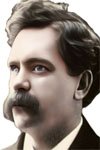B. H. Roberts
Brigham Henry Roberts was a member of the Quorum of Seventy and Church Historian.
- He helped establish the Improvement Era, an official LDS periodical, the predecessor to Ensign.
- He compiled and edited the seven volume History of the Church.
- He compiled and edited the six volume Comprehensive History of the Church.
Book of Mormon Studies
Roberts was regarded as the foremost Mormon theologian of his day. Apostle James E. Talmage relayed a letter to him containing five questions submitted by investigators of the Book of Mormon:- How could the great diversity in primitive Indian languages have occurred in such a short period after about A. D. 400, when the Nephites, whose Hebrew language was so highly developed, disappeared?
- The Book of Mormon reports that the followers of Lehi, upon their arrival in the New World, found horses, which were not in existence when the first Spanish explorers arrived.
- Although the Jews had no knowledge of steel in 600 B.C., Nephi was reported to have had a bow of steel after he left Jerusalem.
- The Book of Mormon speaks of “swords and scimeters,” and yet the word “scimeter” does not appear in early literature before the rise of Mohammedanism, which took place after Lehi departed from Jerusalem.
- Even though silk was not known in America, the Nephites knew of and used silk.
- Unsatisfied with his inability to provide answers, Roberts figured that since the LDS church claimed to be led by continuous revelation, its leaders could provide answers.

|
Roberts went to work and investigated it from every angle but could not answer it satisfactorily to himself. At his request Pres. Grant called a meeting of the Twelve Apostles and Bro. Roberts presented the matter, told them frankly that he was stumped and ask for their aide in the explanation. In answer, they merely one by one stood up and bore testimony to the truthfulness of the Book of Mormon.... No answer was available. Bro. Roberts could not criticize them for not being able to answer it or to assist him, but said that in a Church which claimed continuous revelation, a crisis had arisen where revelation was necessary. After the meeting he wrote Pres. Grant expressing his disappointment at the failure.... These are some of the things which has made Bro. Roberts shift his base on the Book of Mormon. Instead of regarding it as the strongest evidence we have of Church Divinity, he regards it as the one which needs the most bolstering. |
|

|
— B. H. Roberts
Mormon Seventy and Church Historian |
- An excerpt from Roberts’ letter to Mormon prophet Heber J. Grant, expressing disappointment from his meeting with the apostles.

|
I was very greatly disappointed over the net results of the discussion. There was so much said that was utterly irrelevant, and so little said, if anything at all, that was helpful in the matters at issue that I came away from the conference quite disappointed. |
|

|
— B. H. Roberts
Mormon Seventy and Church Historian |
- Roberts was disappointed with the lack of any revelatory insight. He then embarked on an exhaustive study on the Book of Mormon and its origins, with the conviction that if the book is not true, than neither is The Church of Jesus Christ of Later-day Saints.

|
It is not necessary to suggest that maintenance of the truth of the Book of Mormon is absolutely essential to the integrity of the whole Mormon movement, for it is inconceivable that the Book of Mormon should be untrue in its origin or character and the Church of Jesus Christ of Latter-day Saints be a true Church. |
|

|
— B. H. Roberts
Mormon Seventy and Church Historian |
Conclusion
Roberts had a crisis of faith. He concluded from his studies that:
- Joseph Smith possessed the capacity to author the Book of Mormon. See Book of Mormon Authorship
- Publications predating the Book of Mormon, such as View of the Hebrews likely provided the structural material for the book. See View of the Hebrews






